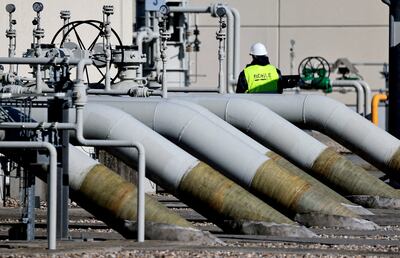Germany was given a gloomy economic forecast on Tuesday as businesses said they would cut output due to sky-high energy costs.
Many companies also expect to cut jobs and scale back investment in 2023, a survey found.
It comes amid high inflation spurred on by the war in Ukraine that has wiped out hopes of a smooth post-pandemic recovery.
After Russia cut off gas exports, Germany was forced to pay much higher prices to import energy on the world market.
Businesses are pessimistic that prices will return to pre-crisis levels any time soon, said Michael Groemling of the German Economic Institute, which published the findings.
“The consequences of the war in Ukraine are still posing a severe test for the German economy,” he said.
Out of 49 groups representing different sectors of the economy, 30 said their members would cut production in 2023, while only 13 said it would rise.
There were 16 who predicted job cuts and nine who expect more recruitment, while 23 expect a standstill in the labour market.
The steel and construction industries face particularly bleak prospects because of their high energy costs.
However, the property and finance sectors are also concerned because of high borrowing costs, the institute said.
The European Central Bank recently raised interest rates to their highest since 2008 in a bid to contain inflation.
Inflation in Germany is in double figures for the first time since reunification in 1990.
The institute’s director Michael Huether said the peak of inflation may have passed, after it fell slightly to 10 per cent.
But he told German radio that inflation would still average a predicted six per cent next year.
“Two thirds of inflation is imported, and when inflation is imported the central bank can’t act so quickly or easily,” he said.
“It can really only do it at the cost of a stabilising recession, but we should avoid paying that price, so it will take a bit longer.”

The German government expects Europe’s biggest economy to go into recession over the winter.
It is hoping that a relief package worth up to €200 billion ($213.2 billion) will ease the pain for businesses and consumers.
People are also being urged to cut their gas consumption by 20 per cent or more to make precious supplies go further.
Mild weather has somewhat improved the picture in the past week, with storage tanks filling up more than they were emptied for five days in a row.
The first imports from a new gas terminal on Germany’s North Sea coast are also meant to ease the pressure.
“Well-filled storage tanks mean energy security for 2023” and for next winter, said Klaus Mueller, the head of Germany’s power grid regulator.


